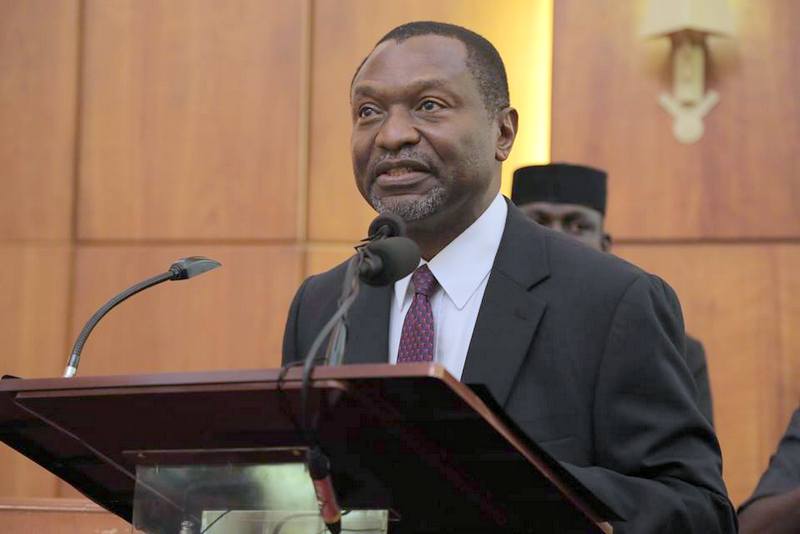The Minister of Budget and Planning, Senator Udo Udoma, has assured that the federal government is putting in place measures necessary to ensure that the economy grows rapidly, while maintaining fiscal sustainability.
Udoma, who acknowledged that the country faces significant challenges with respect to revenue generation, said the government was putting in place measures to vigorously address the situation.
“Macroeconomic stability has been largely achieved. Growth is expected to increase from 0.8 per cent in 2017 to 2.1 per cent in 2018 and 3.01 per cent in 2019, with the continuing implementation of the Economic Recovery and Growth Plan,” he told senior media editors at the weekend in Lagos.
He stated, “Employment growth usually slows down during recession and takes some time to recover. It is not surprising that the National Bureau of Statistics (NBS) data shows that unemployment and underemployment remain high in Nigeria.
“However, it must be emphasised that what the NBS report shows is not that jobs have been lost. It actually shows that there have been a significant net job creation, but that the level of growth in new jobs is less than the number of new entrants into the job market, hence a net increase in unemployment rate.
“We expect a more diversified and inclusive growth over the medium-term, and reduction in the rate of unemployment as we continue to implement the Economic Recovery and Growth Plan (ERGP).”
Meanwhile, analysts at CSL Stockbrokers Limited have warned that notwithstanding the winner of the forthcoming presidential election, Nigeria will face a very tough year.
To this end, they have called for radical reforms to spur economic growth in the country.
The CSL Stockbrokers gave the warning in their 2019 macro-economic outlook titled, “A Bumpy Ride Ahead,” obtained by THISDAY at the weekend.
The Lagos-based investment bank stressed that Nigeria faces a challenging year amid a slowing global economy, elevated geopolitical risks and fragile investor sentiment.
Considering developments in the global economy such as monetary policy normalisation in some advanced economies, the trade war between the United States and China as well as the volatile crude oil market, the analysts noted that the Nigerian economy enters this difficult global environment in a poor state as economic growth struggles to exceed two per cent, with third quarter Gross Domestic Product (GDP) at 1.8 per cent.
Nigeria’s current account also moved into deficit in the third quarter of 2018 while the parallel market exchange rate came under some pressure.
In addition, it noted that public debt in Nigeria is already at uncomfortable levels and continues to rise and “neither of the two prominent presidential candidates have indicated in their manifestos that they understand the macroeconomic challenges facing the country.”
It added, “The uncertainties around the election itself pose a threat to the ability of the country to attract much needed foreign investment and tap international debt markets.
“This will also make financing the budget deficit more expensive. Without radical reform, Nigeria will face a very tough year.
“GDP growth will struggle to reach two per cent. With increasing pressure on the exchange rate, the naira is expected to depreciate to a range of between N385- N390/$. Inflation is also projected to hit a 15-20 per cent range at year-end 2019 and we see the government struggling to finance itself as there’s not much upside to oil price expected.”
CSL Stockbrokers, which is a subsidiary of FCMB Holdings, further projected an average price of $60 per barrel in 2019. Government debt could also balloon out if yields turn markedly upwards and interest payments increase significantly, it stated.
The report predicted that in the year ahead, risks to monetary policy and inflation are skewed to the upside.
It pointed out that with the US Fed poised to raise their benchmark interest rate at least twice in 2019, foreign capital outflows in Nigeria might intensify.
In addition, the uncertainty surrounding the 2019 elections could deter further foreign investment as foreign investors take cover in higher-yielding, less risky investment securities in the US, it added.
“On the back of this, the Monetary Policy Committee (MPC) might be compelled to raise the Monetary Policy Rate (MPR) in a bid to stem the outflow of foreign capital.
“While we envisage a steep increase in inflation to a range of between 15-20 per cent at year-end 2019, we however, expect inflation to remain at current levels till after elections.”











